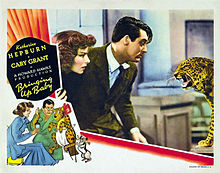Bringing Up Baby
| Bringing Up Baby | |
|---|---|

Original theatrical poster
|
|
| Directed by | Howard Hawks |
| Produced by |
Cliff Reid Howard Hawks |
| Written by |
Dudley Nichols Hagar Wilde Robert McGowan (uncredited) Gertrude Purcell (uncredited) |
| Based on |
Bringing Up Baby 1937 short story in Collier's by Hagar Wilde |
| Starring |
Katharine Hepburn Cary Grant Charles Ruggles Walter Catlett May Robson Fritz Feld Barry Fitzgerald |
| Music by |
Roy Webb (musical director) Jimmy McHugh Dorothy Fields (original writers of I Can't Give You Anything but Love, Baby) |
| Cinematography | Russell Metty |
| Edited by | George Hively |
|
Production
company |
|
| Distributed by | RKO Radio Pictures |
|
Release date
|
|
|
Running time
|
102 minutes |
| Country | United States |
| Language | English |
| Budget | $1,073,000 |
| Box office | $1,109,000 |
Bringing Up Baby is a 1938 American screwball comedy film directed by Howard Hawks, starring Katharine Hepburn and Cary Grant, and released by RKO Radio Pictures. The film tells the story of a paleontologist in a number of predicaments involving a scatterbrained woman and a leopard named Baby. The screenplay was adapted by Dudley Nichols and Hagar Wilde from a short story by Wilde which originally appeared in Collier's Weekly magazine on April 10, 1937.
The script was written specifically for Hepburn, and was tailored to her personality. Filming began in September 1937 and wrapped in January 1938; it was over schedule and over budget. Production was frequently delayed due to uncontrollable laughing fits between Hepburn and Grant. Hepburn struggled with her comedic performance and was coached by her co-star, vaudeville veteran Walter Catlett. A tame leopard was used during the shooting; its trainer was off-screen with a whip for all its scenes.
Although it has a reputation as a flop upon its release, Bringing up Baby was moderately successful in many cities and eventually made a small profit after its re-release in the early 1940s. Shortly after the film's premiere, Hepburn was infamously labeled box-office poison by the Independent Theatre Owners of America and would not regain her success until The Philadelphia Story two years later. The film's reputation began to grow during the 1950s, when it was shown on television.
Since then, the film has received acclaim from both critics and audience for its zany antics and pratfalls, absurd situations and misunderstandings, perfect sense of comic timing, completely screwball cast, series of lunatic and hare-brained misadventures, disasters, light-hearted surprises and romantic comedy. Nowadays, it is considered one of the greatest films ever made.
In 1990 Bringing Up Baby was selected for preservation in the National Film Registry of the Library of Congress as "culturally, historically, or aesthetically significant", and it has appeared on a number of greatest-films lists, ranking at 88th on the American Film Institute's 100 greatest American films of all time list.
...
Wikipedia
